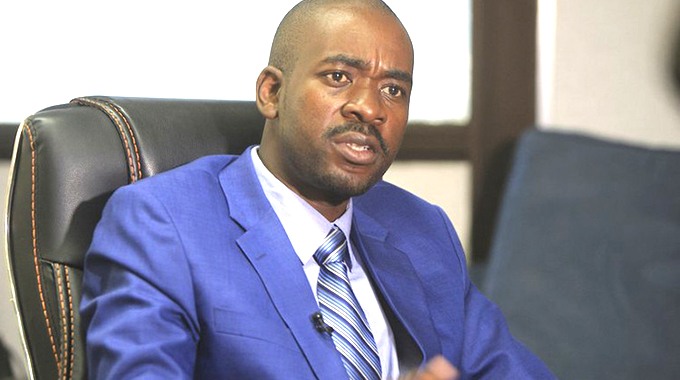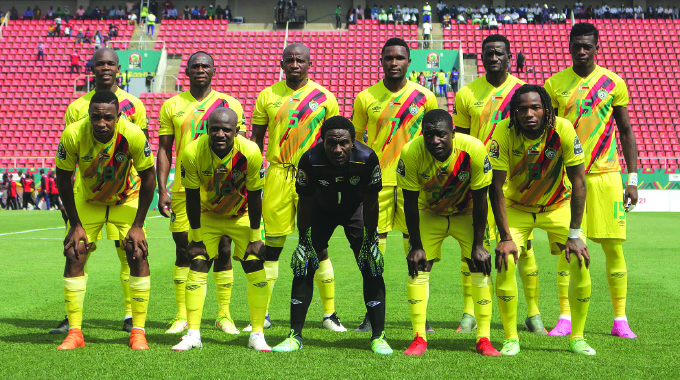Human rights defenders by day, neo-colonialism enablers by night

Nobleman Runyanga Herald Correspondent
Former human rights activist and Human Rights Watch Southern Africa director, Dewa Mavhinga died during the first week of December last year.
Among the foremost mourners of Mavhinga was the MDC Alliance faction leader, Nelson Chamisa. The opposition leader, who was at his rural home in Gutu at the time consoled the Mavhinga family using the social media and went on to speak at Mavhinga’s burial in Chivhu on December 19.
Many people wondered what the connection between the two was when Chamisa used the funeral platform to sensationally claim that he had warned the then South Africa-based Mavhinga not to return home without explaining why.
Many will remember the MDC Alliance faction’s December 2017 “trip of shame” to the United States ostensibly to meet some members of the US Congress and Zimbabweans.
The real reason, however, was that a panicky MDC Alliance faction leadership feared that with the advent of the New Dispensation, the US could work with President Mnangagwa and leave the outfit in the cold.
The delegation comprised Chamisa, one of his deputies, Tendai Biti, and Transform Zimbabwe (TZ) leader, Jacob Ngarivhume. Surprisingly, Mavhinga was part of the team. Such is the nature of the so-called human rights defenders in Zimbabwe.
They are human rights activists by day and at night they assume the role of neo-colonialists’ foot soldiers. In the absence of Chamisa’s predecessor, the late Morgan Tsvangirai, the inexperienced opposition leader needed a Zimbabwean, who received a sympathetic ear from the Americans, to team up with Biti in engaging with Congressmen.
Biti is regarded in the US power corridors as “a friend of the Congress.” Mavhinga, who was an MDC Alliance faction activist, readily came in handy in driving the opposition’s push to ensure that the US retained the sanctions against innocent Zimbabweans despite a new and refreshingly different administration which was ready to re-engage with the West.
The so-called human rights defenders are very useful to neo-colonial powers such as the US in that their (defenders’) efforts are rewarded through the funding of their various human rights civil society organisations (CSOs) that act as their cash cows for self-enrichment.
While Human Rights Watch claims on its website to be “a fully independent non-governmental organisation, supported by contributions from private individuals and foundations worldwide” that accepts “no money from any government, directly or indirectly,” it benefits from funding from individuals such as the American billionaire and “philanthropist,” George Soros.
Human Rights Watch receives funding from Soros’ Open Society Foundation.
In September 2010, for example, Soros announced that his foundation would give a grant of US$100 million over 10 years to Human Rights Watch to enhance its work across the globe.
The US Government may not fund human rights CSOs in targeted countries directly, but it gives tax benefits to people like Soros for their donations because it benefits from the creation and documentation of the so-called human rights violations, which it uses to justify its regime change agenda.
The so-called human rights defenders are the people on the ground who document the alleged human rights abuses and stunts such as fake abductions for the benefit of their Western handlers and benefactors.
Mavhinga was part of a group of numerous other Zimbabwean citizens in various walks of life. These include people such as the recently-elected Crisis in Zimbabwe Coalition (CiCZ) chairman and former Zimbabwe Congress of Trade Unions (ZCTU) president, Peter Mutasa.
While on paper Mutasa was expected to defend the rights of workers irrespective of their colour, creed and political affiliation, in practice he spent most of his tenure assisting the MDC-Alliance faction in advancing the West’s regime change mission.
Although the ZCTU played a midwife role in the formation of MDC in 1999 and its various factions and formations, society expected him to discharge his role as a workers’ rights defender without political bias.
One of the reasons why he was recently booted out of ZCTU was his shameless dabbling in opposition politics. Mutasa ended up taking sides in the MDC infighting involving Chamisa and MDC-T leader, Douglas Mwonzora when the latter was still under the former.
When Chamisa denied salaries to a section of MDC-Alliance who he perceived to be supportive of Mwonzora the worker rights “defender,” Mutasa, was conspicuous by his silence.
The Zimbabwe Mail on May 1, 2020 ran a story entitled “Chamisa admits party workers not paid.”
Despite the fact that the non-payment of the opposition outfit’s workers violated the workers’ right to fair remuneration for work done, Mutasa conveniently remained mum and looked aside.
He never took Chamisa to task over the violation of the workers’ rights.
Towards the tail end of his ZCTU tenure, Mutasa ended up openly fighting Government on behalf of both the MDC-Alliance and its principals in Washington.
When President Mnangagwa announced a fuel price increase in January 2019, the MDC-Alliance faction leadership came under increased pressure from its supporters to use the occasion as an opportunity to make up for the faction’s poor showing during the 2018 election by staging violent protests against Government using the price increase as an excuse.
The MDC-Alliance faction’s leadership could, however, not be seen to be at the forefront of organising the protests after having their fingers rapped by the Motlanthe Commission of Inquiry for the unnecessary August 1, 2018 protest in Harare.
Mutasa and other like-minded people readily volunteered to organise the pointless protests and mindless destruction, which cost many businesses and the economy at large millions of dollars in losses.
It was during Mutasa’s tenure as the ZCTU President that the labour body was used to sidestep the Political Parties (Finances) Act, which bars Zimbabwean political parties from receiving funding from foreign sources.
In 2016, the confederation routinely received funding for projects such as the then MDC-T’s National Electoral Reform Agenda (NERA) initiative from some Western funders such as Sweden.
The funds were then shared among the project, the cash-strapped ZCTU and the broke opposition party, which lost the bulk of its Western funding following its sound trouncing by ZANU PF during the 2013 elections.
Another so-called human rights defender is journalist, MDC-Alliance faction activist and film maker, Hopewell Chin’ono. Although the Ireland-based human rights organisation, Front Line Defenders, describes Chin’ono as a human rights defender, he has no known record of defending anyone’s rights except for his own.
He is known more for fighting Government using his various films and videos which seek to portray it in negative light as part of his efforts to earn his keep from his Western minders.
He is known more for advising the MDC-Alliance faction and encouraging the opposition’s youth to register to vote ZANU PF out of power than for defending the lives of ordinary people, who he either mocks, ridicules or insults for not achieving the kind of “success” that he has attained.
Chin’ono is known for his frustration with Zimbabwean youths, who he accuses of lacking focus, which is a euphemism for the youths’ lack of zeal to join him in fighting their own Government for the benefit of neo-colonial powers such as Washington and London.
For these pains, the “human rights defender” routinely meets the US Embassy officials for briefing and payments.
For his efforts, he is showered with dubious awards. It is, therefore, not surprising that when Chin’ono was arrested for inciting public violence in July 2020, the embassy rushed to use its Twitter handle to express concern and claim that the “investigative journalist” was arrested for exposing alleged Government corruption involving Covid-19 supplies.
Even global media players such as the BBC readily carried the same falsehood as the gospel truth when the alleged Covid-19 supplies procurement anomalies involving a company named Drax was, in fact, first broken by Elias Mambo of Zim Morning Post, who never used the social media to claim credit as Chin’ono did.
Another Zimbabwean citizen, who Front Line Defenders describes as a human rights defender is former MDC-T Dangamvura-Chikanga legislator, Arnold Tsunga.
The Southern Africa Human Rights Defenders Network Chairman is also the Zimbabwe Director of the Washington-based National Democratic Institute (NDI).
While the world expects the country’s so-called human defenders to have earned their stripes by defending the rights of known Zimbabweans, it seems some of them earn the “titles” through their own claims of alleged victimhood at the hands of Government.
Such is the case with Tsunga. He claimed that during the March 2002 Presidential elections while, he and a group of observers were out in an unnamed communal area where they had gone to represent some people who had been allegedly arbitrarily arrested, they encountered soldiers who questioned and assaulted them for several hours.
Tsunga also claimed in January 2006 when he was Zimbabwe Lawyers for Human Rights (ZLHR) Executive Director and a trustee of the American pirate radio station, Voice of America (VOA), that his Mutare family home had been raided by some members of the military.
Since reporting his “suffering” to Western handlers he has been rewarded with posts at organisations that are very strategic to the neo-colonial powers’ enterprise of unseating ZANU PF and replacing it with a pliant opposition administration. This would enable them to have unfettered access to Zimbabwe’s abundant natural resources.
The NDI, for example is very key in the US’ quest to closely monitor, influence and play a key role in Zimbabwe’s electoral processes. It is used to fund elections-related civil society organisations like the Zimbabwe Elections Support Network (ZESN) and ZLHR in the name of providing technical assistance. The former is very handy in the MDC Alliance faction’s perennial claims of vote rigging on the part of the Zimbabwe Electoral Commission (ZEC).
ZESN pioneered the concept of parallel voter tabulation in Zimbabwe to buttress the MDC Alliance’s rigging claims, but so far the efforts have failed dismally to prove any rigging, thereby reducing the opposition’s utterances to mere claims. Despite defending itself strenuously, ZLHR mostly represents anti-Government elements who are arrested “in the line of duty” of advancing the West’s agenda against Zimbabweans, which encourages such people to continue their activities.
The so-called human rights defenders are sometimes assigned to very daring missions. In a bid to understand Zimbabwe’s judicial system, abuse it for neo-colonialists’ designs and destroy it from within, in August 2020 Tsunga applied to join the Constitutional Court bench. Given his anti-Zimbabwe background, he did not make the grade. It is interesting that his attempt came exactly two years after the same court dismissed Chamisa’s Presidential election petition on 24 August 2018.
The foregoing are just examples of the numerous such citizens. The stampede by many so-called resource governance and human rights defenders to associate with the Chilonga community of Chiredzi in March last year, when Government announced plans to move to pave way for a Lucerne-growing project tells a tale of how widespread the human rights defenders’ “practice.”
Be this as it may, progressive Zimbabweans and genuine pro-Zimbabwe organisations such as ZANU PF will continue to defend the country’s sovereignty and independence from the Judases among us who are prepared to assist in handing the country back to former colonialists for personal comforts bought using the Western dirty Dollars. These include posh offices, luxurious lifestyles, huge off-road motor vehicles and trips to the Western capitals courtesy of the likes of NDI and the United States Agency for International Development (USAID).










Comments